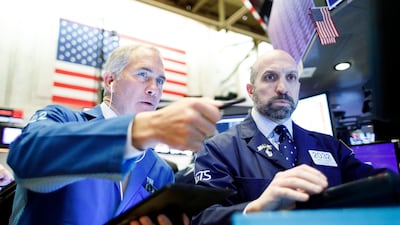Global stocks plunged to four-month lows, government debt yields sunk to unprecedented levels and crude oil extended declines as anxiety over the spread of the coronavirus deepened.
The S&P 500 tumbled 4.4 per cent to close at the lowest levels of the day. It whipsawed investors earlier, turning lower later on after California’s governor said the state was monitoring 8,400 people for signs of the virus after they travelled to Asia.
The decline of more than 10 per cent since last Friday has the benchmark on pace for its worse week since the 2008 global financial crisis and helped push the index into what is known as a correction. The MSCI All-Country World Index fell to the lowest since October, while the Stoxx Europe 600 also entered a correction.
“Stocks and bonds say we’re doomed,” said Chris Rupkey, chief financial economist for MUFG Union Bank. “Anyone who has a better idea for what lies ahead please let us know because right now the direction ahead for the economy is straight down.”
The outbreak has the potential to become a pandemic and is at a decisive stage, the head of the World Health Organisation said Thursday. The global economy is on course for its weakest year since the financial crisis as the virus damages demand in China and beyond, Bank of America predicted. Earlier, Goldman Sachs slashed its outlook for US companies’ profit growth to zero. Germany is examining potential stimulus measures to stem the economic impact. Saudi Arabia halted religious visits that draw millions.
Haven assets continued to be in demand, and the yen strengthened as yields on 10-year US and Australian government bonds hit fresh record lows. Oil sank further. The pound reversed a gain after the UK told the European Union it could walk away from the negotiating table in June if progress isn’t being made toward a trade deal.
Investors are pricing in a Federal Reserve easing in April followed by another rate cut in July, swaps data show, while bets for easing from Japan to Australia have also increased after the International Monetary Fund cut global growth forecasts.
Losses continue to mount as investors weigh each gloomy headline on the virus. US health authorities on Wednesday said they found the first case of the illness that does not have ties to a known outbreak. Microsoft joined an expanding list of companies warning over the impact of the virus on operations.
“The way the market is going down, it’s happening pretty quickly, but it’s very difficult to say that it’s over,” said Sameer Samana, senior global market strategist for Wells Fargo Investment Institute. “Bottoming is a multistep process and you’re probably still in step one.”
Consumption and supply is expected to be significantly affected due to the spread of coronavirus, Neil Robson, head of global equities at Columbia Threadneedle said in a note.
“We see two clear impacts; lost consumption and lost supply. Looking at the evidence from China, as the disease becomes the dominant factor in people’s thinking consumption falls.”
An Adidas market update last week stated that its Chinese business had fallen by 85 per cent, he said.
“The second element is supply disruption, where we are seeing clear evidence of critical component shortages leading to underproduction. Apple already confessed to this last week, and we will hear much more.”
He also said companies will experience a period of negative earnings revisions which will continue to impact the market.
“While we have not made a formal estimate, it is possible we will see earnings downgrades of double figures.”
Oil prices plunged on Friday with international benchmark Brent trading at $50.91 per barrel, down 2.43 per cent at 3.27pm UAE time. US crude was down 3.19 per cent at $45.59 per barrel.
"Probably our best hope for some relief from the selling in the near-term is that oil prices bounce, lifting energy stocks. That certainly hasn’t happened so far. It has been richly priced tech stocks and oil sensitive energy companies dragging the market lower this week," said Jasper Lawler, head of research at London Capital Group.
"Having waited this long to react, Opec and its allies will need to cut very deep. They need to counteract the undefined demand destruction caused by the coronavirus."

